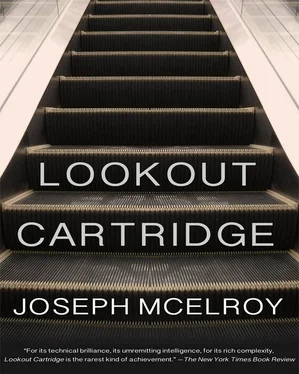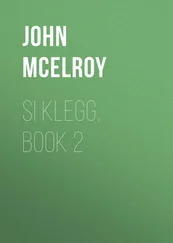Joseph McElroy - Lookout Cartridge
Здесь есть возможность читать онлайн «Joseph McElroy - Lookout Cartridge» весь текст электронной книги совершенно бесплатно (целиком полную версию без сокращений). В некоторых случаях можно слушать аудио, скачать через торрент в формате fb2 и присутствует краткое содержание. Год выпуска: 2014, ISBN: 2014, Издательство: Dzanc Books, Жанр: Современная проза, на английском языке. Описание произведения, (предисловие) а так же отзывы посетителей доступны на портале библиотеки ЛибКат.
- Название:Lookout Cartridge
- Автор:
- Издательство:Dzanc Books
- Жанр:
- Год:2014
- ISBN:9781941088036
- Рейтинг книги:3 / 5. Голосов: 1
-
Избранное:Добавить в избранное
- Отзывы:
-
Ваша оценка:
- 60
- 1
- 2
- 3
- 4
- 5
Lookout Cartridge: краткое содержание, описание и аннотация
Предлагаем к чтению аннотацию, описание, краткое содержание или предисловие (зависит от того, что написал сам автор книги «Lookout Cartridge»). Если вы не нашли необходимую информацию о книге — напишите в комментариях, мы постараемся отыскать её.
Lookout Cartridge — читать онлайн бесплатно полную книгу (весь текст) целиком
Ниже представлен текст книги, разбитый по страницам. Система сохранения места последней прочитанной страницы, позволяет с удобством читать онлайн бесплатно книгу «Lookout Cartridge», без необходимости каждый раз заново искать на чём Вы остановились. Поставьте закладку, и сможете в любой момент перейти на страницу, на которой закончили чтение.
Интервал:
Закладка:
But a briefly fast 64 fps if you ever get it developed comes out of your 24 fps projector slow motion.
Babysitters were thirty cents an hour, chars sixty. Lorna began to want a job, but an interesting one. The children were still too young. We bought a better piano. By the time we moved to High-gate to a house that despite the corruption of its roses is worth nine times what we paid for it in ’58, I was glad to leave that plain white room bare again, a possibility for someone else, and Dagger DiGorro on May 24 would not have understood my sense of the room we filmed — a room anywhere, a future.
Jan Aut’s marmalade cat walked slowly out of the Unplaced Room and made its way to the kitchen. The phone had rung again, so I waited. Kate had said Speak of the …when she picked up; then she said, Her brother; then a succession of yeses; and then: I’ll tell him.
When she came out she was the gallery girl again, and so, picking up her last remark before the phone calls, I said, Jan’s persuasive all right but she needs a helping hand.
I nodded at the picture leaning against the piano leg. Kate looked pretty well through me, but found a smudge of foreign matter and could not look further.
Where are you off to now?
Back to New York, I said, some work that Paul’s involved in. I’ve hardly been away.
Kate’s hand found the collarbone, but no connection occurred, and I wondered if she had tried two glasses of warm water and a good vomit first thing before breakfast.
She couldn’t quite let me go. What limit would my going put upon her? She ran her words together: Just as well this film was lost, p’raps you’ll try another someday.
I took two steps to her, my hands at my sides: Who says it’s lost?
Beyond her shoulder I saw the door to the Unplaced Room stir but it was only my angry imagination fueling the fire of my diary with a chair seat and a table leg or two from the absent brother’s hut.
I had a hand on her shoulder and did not let her move. I asked what the devil she knew about an Unplaced Room, or Māyā, or a Hawaiian Hippie playing a guitar under the Science Museum and his little girlfriend from Long Island in a U.S. sergeant’s jacket swaying from one boot to the other above a dirty yellow felt hat on the ground with a coin in it. What had such a thing to do with Kate’s job in a gallery, with a green, stone-walled private school? What was West Hempstead, Long Island, to Kate? Not even a suburban town that supplied an entrant for the Miss New York State contest. Had Kate any feeling for a couple like that? the boy’s father in the iron business in Honolulu County, the girl’s father in the carbon business; the girl as American as a Duncan Hines brownie, the boy as American as a quart can of pineapple juice, a dropout on the move represented in the 1960 tattoo on Savvy Van Ghent’s strong arm by one star no newer than the star that stands for that ancient and fundamental signatory state Virginia. There was a simple power in the two of them together that Kate could disparage as boring and American and even unsavory—
Wait, she said without removing her shoulder from my hand, oh wait, half my friends are Americans.
I said what could Dagger’s rhythm of approach mean to Kate. Without a dolly he had had to level his walk as if with a sort of slow-motion gear astonishingly well-coordinated, the camera like a quart of trinitro-glycerine — though the different speeds at which he went by the two young people did not include actual slow-motion, though after five or six passes we set up right in front of them so pedestrians who’d been our camera point of view would now be separate and pass between us and the two kids—
I may not know what you mean by Māyā but I do have some feeling for fine things—
— and now at my urging (for two bowlers and two rolled black umbrellas came bobbing and capering toward us respectively down the passage) we went to 64 frames a second so in the print the Hawaiian Hippie’s fingers would be dream-slow and the girl’s bending and swaying might hint of girls in grass skirts and thick swinging leis performing to make compatriot tourists feel right at home under a sunny volcano just as the bowlers and brollies marched darkly past in a sudden resumption of the sound of the hard authentic unsweetened version of “Both Sides Now,” and Dagger had made the preceding series of approaches from the Science Museum end of the tunnel with the South Ken Underground end facing us beyond the boy and girl almost as if we were trying again and again to make someone appear at that end and come toward us, but I had inserted a silence without telling Dagger, just switching off the little Nagra we were using while creating a silence between the music so the music would ride on with its own momentum or the viewer could suddenly find he’d been making his own music all the time, or silence would plunge him into meditation. Dagger had said when we started out that American kids playing in Undergrounds around London could be a good little scene and Jenny you see had spoken a day or two before of how she and I and Will used to go to the Science Museum and the Natural History Museum and so I suggested that pedestrian tunnel and there we found this boy and girl but they weren’t there when Reid and Jenny ran into Dudley and Jane in the same tunnel three weeks later.
The same tunnel? said Kate, and I removed my hand from her shoulder. I was between her and something that was going on outside this flat.
Yes the same tunnel, I said, and Dudley Allott was wearing a black V-neck pullover under his mac exactly like one that was packed in a later scene of our film.
But wasn’t it a coincidence their meeting?
They were bound to meet someday, I found myself saying. Like Dudley and your employer’s brother-in-law Monty Graf who have been on the blower discussing Maya within the last seventy-two hours. Like Nash and the deserter at Stonehenge.
Kate backed away and sat down by the table from which I’d taken the red jaguar. That was Monty Graf just now, she said, and I had the sense (which I felt then that no formula could validate) that I’d drawn her into a moment of freedom where accelerations had equaled one another and she would give me anything I wanted, even the knowledge of what it was I wanted. The door of the Unplaced Room moved. The cat, having come out of the kitchen, walked across a rug. Put the two shots together, rig the illusion of an adventure, and the viewer like some attentive victim-to-be of terrorism could be made to see the cat as moving the door instead of the real event which was the wind from the window of our May 24 film scene which at that moment of increasing weightlessness and vision I inclined to see as my own presence in that Unplaced Room plotting my way, glad of my young wife’s willingness in the fifties to live abroad for a while, listening to Will somewhere in that first house screaming while I watched Miss Topp and blue-nosed Mr. Sharpe with his pruning shears in the adjacent garden standing like conspirators by the smoking incinerator into which he had stuffed refuse, and the two of them then turn to catch me watching from my study which in ’58 I was to abandon for the Highgate house where my study had none of that free unspecified air in which as in our film much was possible.
Or for that matter (I said) me and Phil Aut’s cameraman who wouldn’t have understood the silence I inserted like a breath of seawater waxed in your ears.
The words came unchosen, and I added, Oh we ran him ragged at Stonehenge, he didn’t have a clue.
There’s not much John misses, said Kate.
For one thing, I said, he sometimes misses Incremona’s moods. Which is about as risky as you can get. Now that was a coincidence, I said (thinking that that bumptious John of the Marvelous Country House had certainly not been the other man with the movie camera at Stonehenge).
Читать дальшеИнтервал:
Закладка:
Похожие книги на «Lookout Cartridge»
Представляем Вашему вниманию похожие книги на «Lookout Cartridge» списком для выбора. Мы отобрали схожую по названию и смыслу литературу в надежде предоставить читателям больше вариантов отыскать новые, интересные, ещё непрочитанные произведения.
Обсуждение, отзывы о книге «Lookout Cartridge» и просто собственные мнения читателей. Оставьте ваши комментарии, напишите, что Вы думаете о произведении, его смысле или главных героях. Укажите что конкретно понравилось, а что нет, и почему Вы так считаете.












